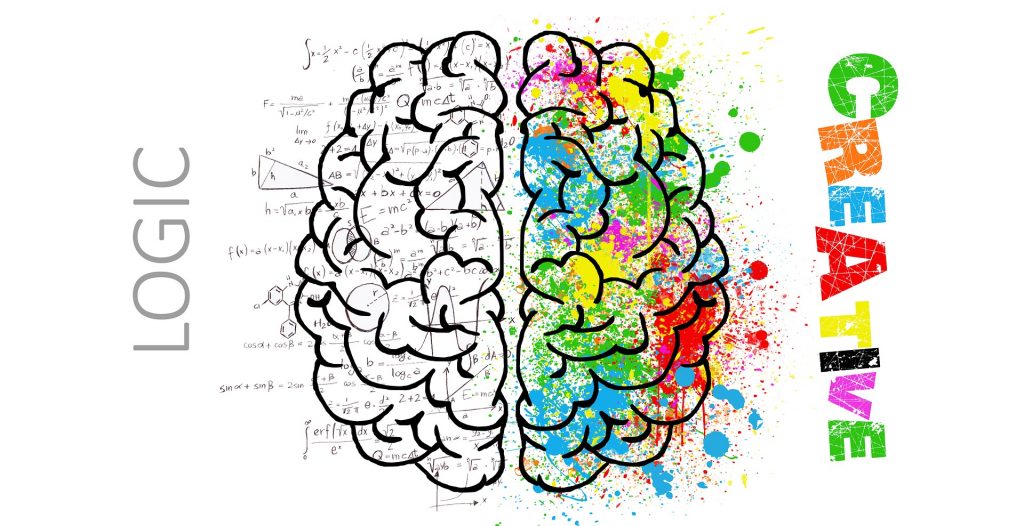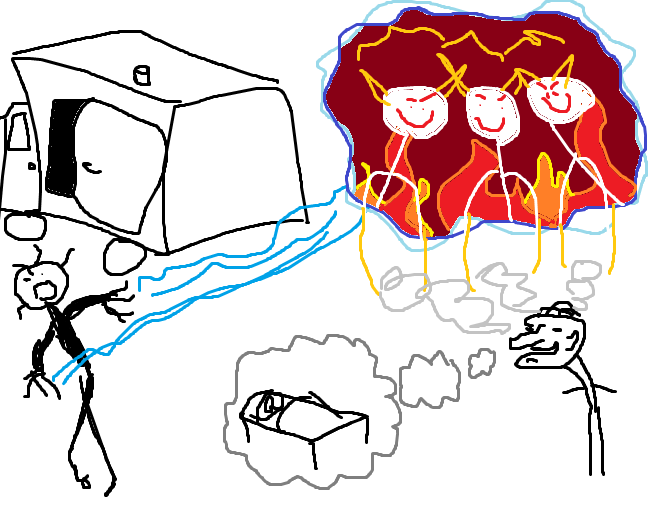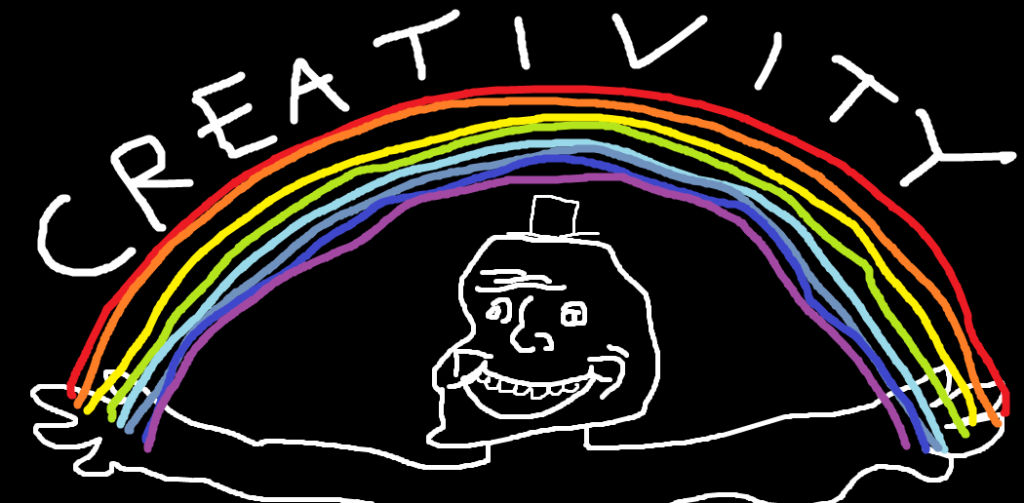If you’re struggling to stay productive, you may be overthinking life. By thinking less, you will develop the mental discipline to break out of procrastination before it’s too late.
But you may be thinking,
“What do you mean — do I have to stop using my mind? How can I be productive if I can’t reason or use logic?”
If you’ve studied meditation to any extent, you will be familiar with the concept of a thinking mind and an observer. Between these two entities, there lies a crucial distinction.
Firstly, the intellectual mind is the part of you that uses logic. Also, it is always trying to explain, justify, rationalise, and reason.

Indeed, these are all useful functions for human dominance, though, this part of the mind can be excessive; it is not turned off nearly as often as it should be.
Secondly, the observer is your awareness of the world — your consciousness. Not only does it include your experience of the five senses, but it allows you to observe your own (intellectual) mind.
Therefore, you are able to “listen to yourself” (in your head) and even argue with yourself — absurd!
Henceforth in this article, I will use this model to explain how mental stimulation affects productivity. This is based on reflections of my own experience, so think carefully about how you can incorporate this information into your own life.
Good sleep = control your thoughts: How to Sleep Easily for More Happiness and Better Focus
insert_linkYour Mind is Weak. Consciousness is Unlimited
Whereas the mind is confined to rigid limitations, your consciousness is not.
Although, the truth of this statement may depend on how you look at things; you can’t really talk about consciousness as such.
Nonetheless, it is absolutely certain that, beyond your mind, there is a source of energy from which you can draw. So, in times of physical and mental exhaustion, you can override your weak body.
This is important because it is this very weakness that causes unproductiveness and procrastination. You don’t want that. Conversely, you want to transcend your weak mind.
Consequently, through this act, you will develop mental discipline — discipline beyond intellectual thinking.
Your mind is always looking for the easy thing to do, thus it tends to avoid pain. As a result, this is not something you would want to feed!
Yet, this is what so frequently happens with the explosion of the Internet, especially social media. The mind is continuously being busied, so much that we rarely ever feel bored.
And, when we do feel bored, I suspect it would be slightly more unbearable.
After all, the generation of the Internet has become accustomed to a fast-paced society that never sleeps.
Accordingly, a mobile phone is always on hand, so we can keep ourselves entertained wherever we are. Video games. Social media. The news.
Alas, this shunning of boredom can negatively affect your discipline. Needless to say, the most obvious flaw in your mental discipline is the inability to cope with boredom. (Or, at least, the disliking of it in one form or another.)
insert_linkYou’re Giving the Mind Ultimate Control of Your Fate
Why are many people fighting to keep boredom out of their lives? In fact, it takes more discipline to attempt to override this temptation.
This is because the mind is in complete control!
When you surrender yourself entirely to the intellect, your life becomes unbalanced. Additionally, you become wired up to the poisonous drug of ongoing mental stimulation.
But is this actually bad? Surely, the intellect would be able to reason hence realise, with logic, what the most productive thing is to do.
Indeed, you could use logic and reason to recognise when you’re procrastinating and so on. However, the constraints to the mind still apply:
- Limited willpower
- The mind does not reliably think straight — for instance, with lacking sleep or mental fatigue
- Irrationality — the mind chooses the easy, not productive, path when left unattended.

insert_linkTame the Mind by Reducing Mental Stimulation
With this in mind, how do you develop mental discipline? By assuming authority over your mind and being present in the moment.
This, to clarify, is a form of meditation, only that it is for life.
Mindfulness is undoubtedly a key skill in developing the discipline to be productive.
When you can overrule the mind, you have conquered its inconvenient limitations. While it cannot be trusted to keep you from straying off the path of productivity, deep down, your consciousness always knows what is right and wrong.
Therefore, when your consciousness is in control, you have the mental discipline to work hard.
But, remember, your consciousness can only take control when you’ve turned your mind off. This is the power of not thinking.
This is why you need to cut off mental stimulation.
This is why you need to embrace boredom as essential for productivity, rather than a waste of time.
End unwanted mental stimulation: Avoid the News! 5 Tragic Reasons Why It’s Wasting Your Time
insert_linkEnter a Realm of Happiness and Joy — Free from Pain
Fortunately, you can always escape the problems of life. And that is by not labelling situations as problems!
This is because the mind is the source of all negative emotions and experiences. In Stoicism, for example, there is the prevailing idea that you are responsible for everything, including how you react and interpret situations.
If you interpret a situation as bad, you will be blinded by negativity, hence wasting your time. On the other hand, when you focus on the invisible positives, you’ve conquered your mind — which supports a productive lifestyle.
Additionally, imagine the constant voice in your head as a separate person who follows you everywhere. Annoying? I think so.
Simply stop thinking, though, and you’ve just killed that unsolicited, ceaseless commentator. This is an act of great mental discipline.
insert_linkBoost Your Creativity and Solve Lingering Problems

There are other ways an empty, conscious head can increase your productivity.
In the past, I have emphasised the unignorable importance of taking breaks between concentrated work sessions. Contrary to instinctive expectation, these breaks are not in fact unproductive.
Rather, by not thinking about the work, you have the freedom to be more creative. This, consequently, increases the quality of your work, in addition to your efficiency.
Likewise, your problem-solving capability will be increased; an unthinking mind allows solutions to come to your head much faster than fully involving yourself in the problem continuously.
Take a break, and trust that the solution — or at least a pointer in the right direction — will eventually come.
insert_linkDeveloping Mental Discipline Is the Cure to Overthinking
Moreover, have you ever overthought a particular issue or decision? I certainly have.
For instance, I remember deviating significantly from the productive path to think about diet. Endless days of research, planning, and, most notably, frustration. (After all, figuring out a diet is crazily complex.)
Overthinking is a result of allocating a disproportional amount of energy to your intellectual mind. The real problem here is that you will never reach a clear decision because you’re going on the same information. Again, and again.
Repeatedly switching from side to side, your mind is a broken record running down an entangled chain of logic and reasoning. Without adequate information, logic and reasoning are not enough!
So, take time to step back.
Were my days of thinking entirely about diet a clear waste of time? Not entirely. Although, I could have saved countless hours had I switched off my intellect.
Often, the options you’ve narrowed down are pretty good; it may not matter that much which is the ‘perfect’ path to take.
But there may not even be a ‘perfect’ choice.
Even a suboptimal decision could work well as long as you put in the effort and commitment.
Why breaks are productive: Is It Possible for You to Be Productive All the Time? (Hint: Yes!)
insert_linkThe Mind Distracts You from What Truly Matters

Especially when you are tired, you tend to daydream a lot. For me, these fantasies would entail the designing of rocket engines.
Additionally, I would imagine myself explaining a concept new to me (e.g. the effect of carbohydrates on insulin) or some other random conversation.
Are these thoughts useful? When considering the benefit compared to the detriment, no, they are not.
So, when you are daydreaming, turn off your brain in order to win back your time.
After all, you should spend your thinking time on the things that matter, not pointless daydreams.
The consequence of not doing this is substantial: you will get carried away by the distracting mind.
To exemplify, I remember lying on the floor one evening, thinking. Essentially, I was unconscious due, to my overruling, thinking mind.
As a result, I missed my ideal bedtime.
Furthermore, thinking unnecessarily can cause you to search for pointless tasks when the next step becomes unclear.
Returning to the evening, I sometimes lost a sense of direction after completing all the planned tasks on time. All that was left was to go to sleep — early.
However, left unchecked, your intellectual mind will find additional things to do to fill the time. It will also make excuses, arguing that you have the extra time to do more productive things.
Otherwise, you may sit around thinking about what next to do.
Here, the obvious solution is to have enough faith to disable the mind, allowing to you sleep with ease.
insert_linkTrain Yourself to Regulate Mental Stimulation
As a result of habit, it will undeniably be difficult to unplug mind from the constant stream of noise.
To not to be addicted is to be free. To be free is to have endless discipline.

Cal Newport talks a lot about preventing this heavily interconnected word controlling your life. So, perhaps you might want to check out his book, Digital Minimalism. It seems quite self-explanatory, albeit I have not read the book myself (yet).
“Yes, Bobby-Jim, embracing an offline-dominated life sounds fantastic — how else can I develop my mental discipline?”
Put simply, you practise; try detaching yourself from mentally stimulating situations from time to time.
Most obviously, you could engage in a daily mindfulness meditation practice, observing the breath and the body. In addition, you could set alarms for various intervals throughout the day to remind yourself to stop thinking.
The idea here is to start taking control of your life, thus, to wake up.
For you see, most people go their entire lives in autopilot mode. However, once you dissociate yourself from your mind and ego, you truly have free will.
Take the wheel: 9 Self-Control and Discipline Strategies: Break Free Now!
insert_linkConclusion
Putting a halt to your thoughts it not the only component to developing mental discipline. Of course, you always have the challenges involved in transcending your thoughts in the first place.
This is why meditation is a practice for life: mastery of the mind takes a continual, consistent effort as well as the determination to be more than a mere mortal.
I know I have hit you with some abstract information today, so it’s understandable if you don’t know where to go immediately.
With this in mind, I will leave you with the amazing concept of the 5 Second Rule, developed by Mel Robbins.
In essence, when trying to get yourself to do something, you count down from five to one. Subsequently, you should find yourself propelled by the higher angels to take action and overcome fear.
How does this work? Well, one thing this does is it stops you from thinking. So, your mind has no time to generate doubts nor excuses.
Thus, I declare this as an effective strategy to develop mental discipline and overcome procrastination.
insert_linkBook Recommendation of the Week
If you did not quite understand what on Earth I was on about, or you merely want to explore this topic further, please read:
The Power of Now by Eckhart Tolle
You won’t regret it. That being said, I must warn you to have an open mind — the ideas may not quite sit with you at first…
Thank you for sticking with my words up to now! Also, I welcome you to leave a comment and answer this question:
Are you always trying to busy the mind?



